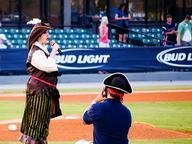Quiz Answer Key and Fun Facts
1. The French lines "Pincez tous vos koras, frappez les balafons" are the start of the national anthem of which country?
2. Which country, on achieving independence in 1966, adopted a national anthem that starts with these lines?
"Fatshe leno la rona - Ke mpho ya Modimo - Ke boswa jwa borraetsho - A le nne ka kagiso"
3. In which former British colony does the national anthem begin with these lines?
"Glory to thee, Motherland - O Motherland of mine - Sweet is thy beauty - Sweet is thy fragrance - Around thee we gather - As one people - As one nation."
4. The Kiswahili lyrics here are the start of which country's national anthem?
"Ee Mungu nguvu yetu - Ilete baraka kwetu - Haki iwe ngao na mlinzi - Natukae na udugu - Amani na uhuru - Raha tupate na ustawi."
5. The first verse of 'Koste Seselwa' is: "Sesel ou menm nou sel patri - Kot nou viv dan larmoni - Lazwa, lanmour ek lape - Nou remersye Bondye."
What country adopted this national anthem in 1996?
6. Here is the start of the national anthem that replaced 'God Save the Queen' in 1961 for the citizens of which country?
"High we exalt thee, realm of the free - Great is the love we have for thee - Firmly united ever we stand - Singing thy praise, O native land."
7. "Nkulunkulu Mnikati wetibusiso te Maswati - Siyatibonga tonkhe tinhlanhla - Sibonga iNgwenyama yetfu - Live netintsaba nemifula."
So start the siSwati lyrics to the national anthem of what country?
8. The song 'Nkosi Sikelel' iAfrika' became a pan-African liberation song, and was adapted to be the national anthem of five different nations. Which country uses these Swahili lyrics for the song?
"Mungu ibariki Africa - Wabariki Viongozi wake - Hekima Umoja na - Amani Hizi ni ngao zetu - Africa na watu wake."
9. In what landlocked country was 'Ishe Komborera Africa' (an anthem shared with several other countries) replaced by a Sosha song that starts with these lines?
"Simudzai mureza wedu weZimbabwe - Yakazvarwa nemoto wechimurenga;"
10. What nation put these English words to the tune of 'Nkosi Sikelel' iAfrika' for their national anthem? The ellipsis replaces the country's name.
"Stand and sing of ..., proud and free - Land of workers and joy in unity - Victors in the struggle for the right - We have won freedom's fight - All one, strong and free."
Source: Author
looney_tunes
This quiz was reviewed by FunTrivia editor
stedman before going online.
Any errors found in FunTrivia content are routinely corrected through our feedback system.
